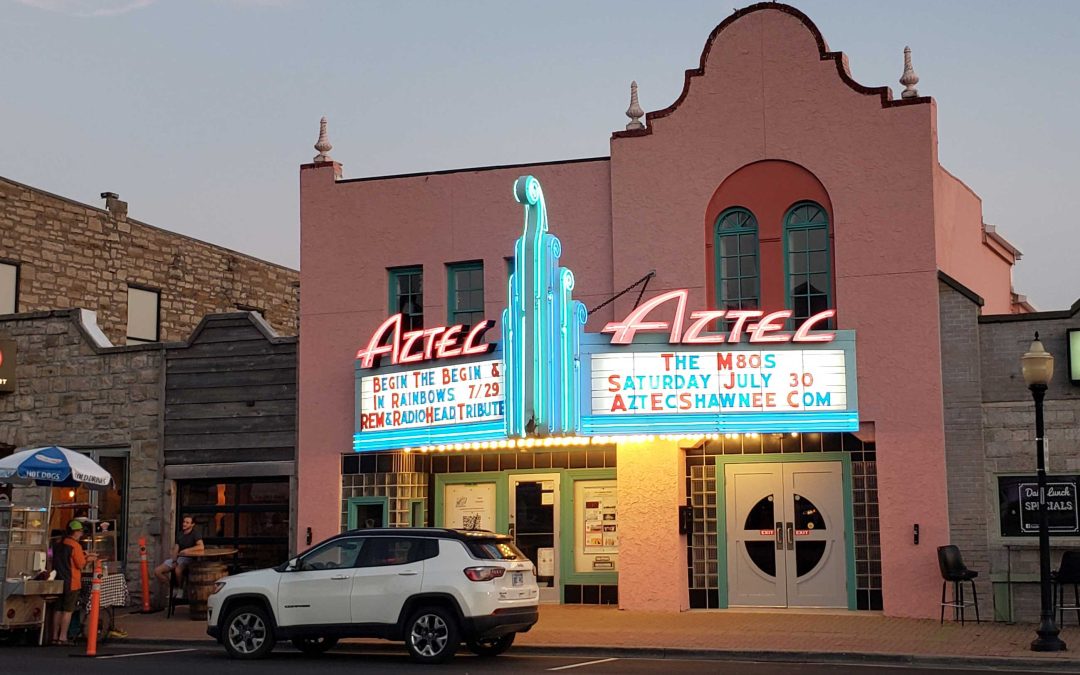(Photo by Patti Klinge)
September 2022
Cover Story
Let’s go to the movies
Vintage movie venues have entertained audiences for decades
by Corbin Crable
Streaming services, be advised – you can’t keep a good movie theater down.
People have predicted the death knell of movie theaters for years, but they continue to be a draw for those who love a good, old-fashioned moviegoing experience. Those experiences you remember vividly from your youth remain available at small, independently-owned venues throughout Kansas, Missouri, and the rest of the country. They have a long history, whose richness matches the loyalty of the customers who visit them regularly. In this issue of Discover Vintage America, we take a peek behind the curtain of just a few.
The Glenwood Arts and The Rio Theatre – Overland Park, KS
This year, twin brothers Ben and Brian Mossman celebrate 40 years in business as the Fine Arts Group, which has owned and operated independent movie theaters in the Kansas City metro area since 1982.
The Mossman brothers’ current theaters – both located in Overland Park – are The Glenwood Arts and The Rio. Like most businesses, the theaters closed in the early days of the COVID-19 pandemic; the five-screen Glenwood Arts has since reopened, and the single-screen Rio remains temporarily closed.
Over the years, the Fine Arts Group’s theaters have come and gone, though they’re still spoken of lovingly by former customers – The Fine Arts Theatre, The Englewood, and Red Bridge, just to name a few.
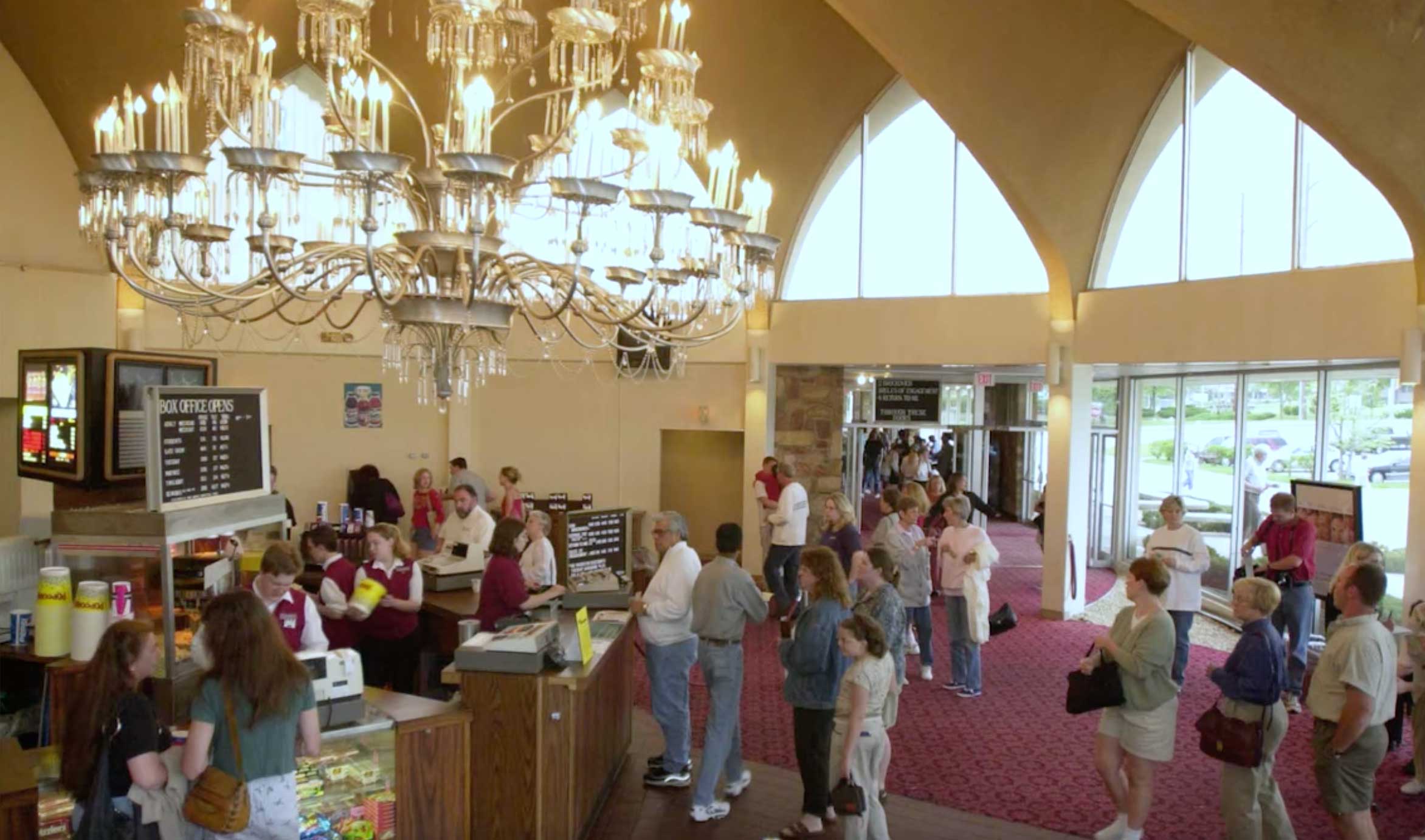
Lobby of the new Glenwood Theatre
The lobby of the new Glenwood Theatre features neon signage for a retro feel. (Photo by Patti Klinge)
Glenwood Arts and The Rio
Both the Glenwood Arts and The Rio offer guests a moviegoing experience that simply can’t be found with large chains like AMC or Cinemark. Before the Glenwood Arts Theatre moved to its current location in the Ranchmart Shopping Center and merged with the shuttered Leawood Theater – which had been owned by Kansas City-based Commonwealth Theaters since the late 1960s before it closed in the 1990s – the Mossmans were able to salvage multiple items, including the original Glenwood’s colorful, atomic-age marquee (which remains in storage). Step into the lobby of the Glenwood Arts and you’ll see original film posters from classic movies like “Duel Au Soleil” (1946) and “Singin’ in the Rain” (1952) among portraits of old-time movie stars like Ava Gardner and James Dean. A neon sign simply reading “Refreshments” buzzes above the concession stand, a large wooden plaque bearing the visages of the twin gryphons of comedy and drama hangs outside auditorium number one (it’s just one of the relics the Mossmans brought over from the Glenwood Arts Theatre in the now-defunct Metcalf South Shopping Center at 95th and Metcalf – that theater operated from 2002-2015, and bore the name of its predecessor, the original Glenwood, which operated from 1966 to 2000). The Glenwood Arts retains the Leawood Theatre’s original seats, and its crest appears splayed across the lobby’s teal-and-purple carpet.
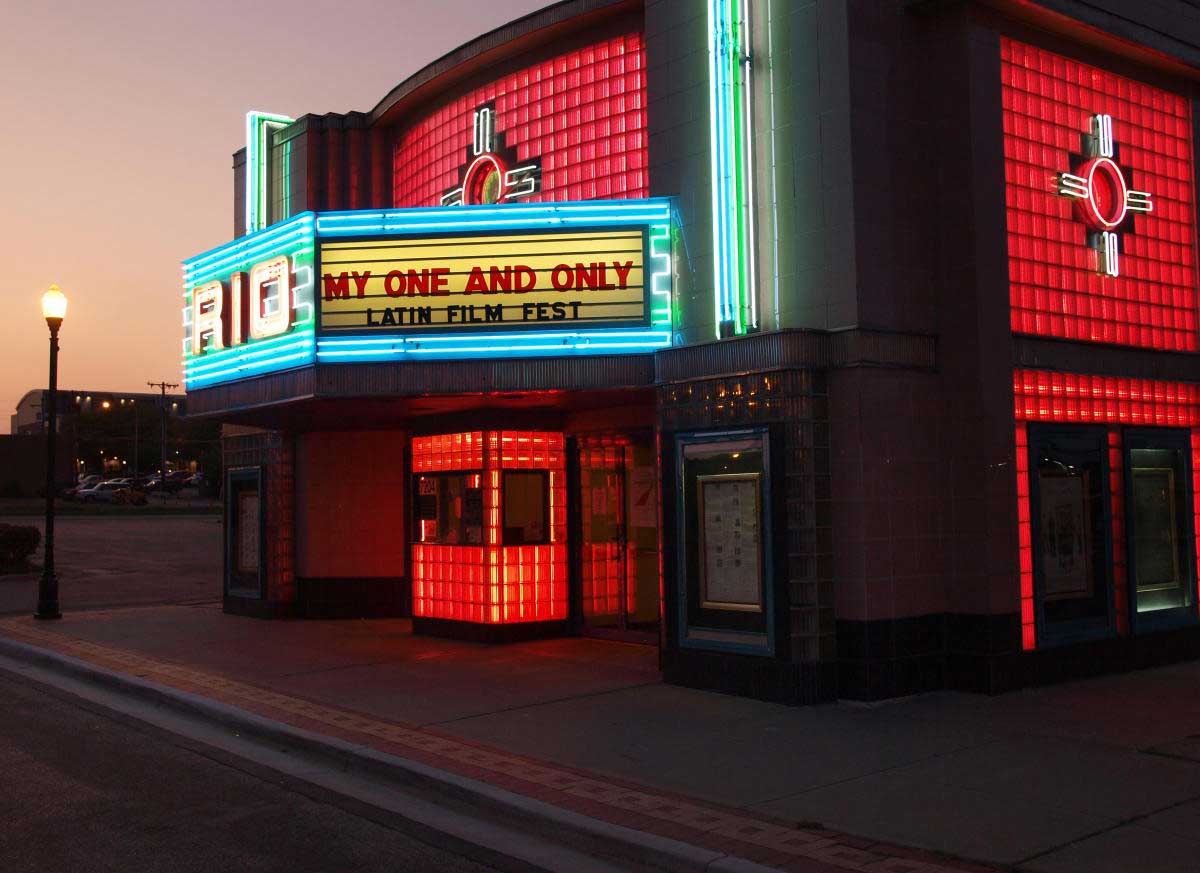
The Rio Theatre in Overland Park, KS
The Rio Theatre in Overland Park, KS, remains closed until more staff can be hired, among other reasons cited by the owners. (Image courtesy of The City of Overland Park)
Our customers are valued
“Our customers are valued. We try to give them information or strike a conversation with them,” says Ben Mossman, president and co-owner of The Fine Arts Group. “We don’t say, ‘Give us your money and go in.’ In one sense, it’s a step back in time. We have artifacts that dictate that. Our theater is neon and glass brick.”
The clientele of both theaters skews older, and though they’re returning to the Glenwood Arts, it’s been a slow climb to get back to attendance numbers that justify adding more showtimes to the theater’s roster.
“Our clientele was more reserved in going out into a group function. They were the first to stay away and the last to come back, mostly due to their age and whether they had health issues,” Mossman notes.
The Overland Theater, which originally opened on Christmas Day in 1946 and would later become The Rio, remains a favorite local landmark of moviegoers. Located near downtown Overland Park, the theater hosted Theatre for Young America in the late 1970s and was sold to the city in 1987. The Mossmans would eventually purchase the building in 1993, and after a years-long renovation process, the thater reopened on June 30, 2000.
“The theater had been brought to life again with all its old style and much of its original material intact,” according to the Johnson County Department of Parks and Recreation. “The revitalized façade features new peach-colored porcelain tiles, neon lighting, aluminum trim, rebuilt poster cases, and a recreated marquee and glass block ticket booth.”
Rumors about the fate of the still-closed Rio have swirled on social media for months, leading followers to speculate whether the theater will remain permanently closed. Mossman says the Rio will reopen once business at the Glenwood Arts is high enough to warrant opening the single-screen location and spending money on its electrical and heating/cooling bills, and upkeep. Another issue is the need for more employees – like so many other small businesses across the country, the Fine Arts Group has had difficulty finding employees in recent months.
“We can’t get help,” Mossman says. “We couldn’t even add showtimes (at the Glenwood Arts), but we don’t have enough help.”
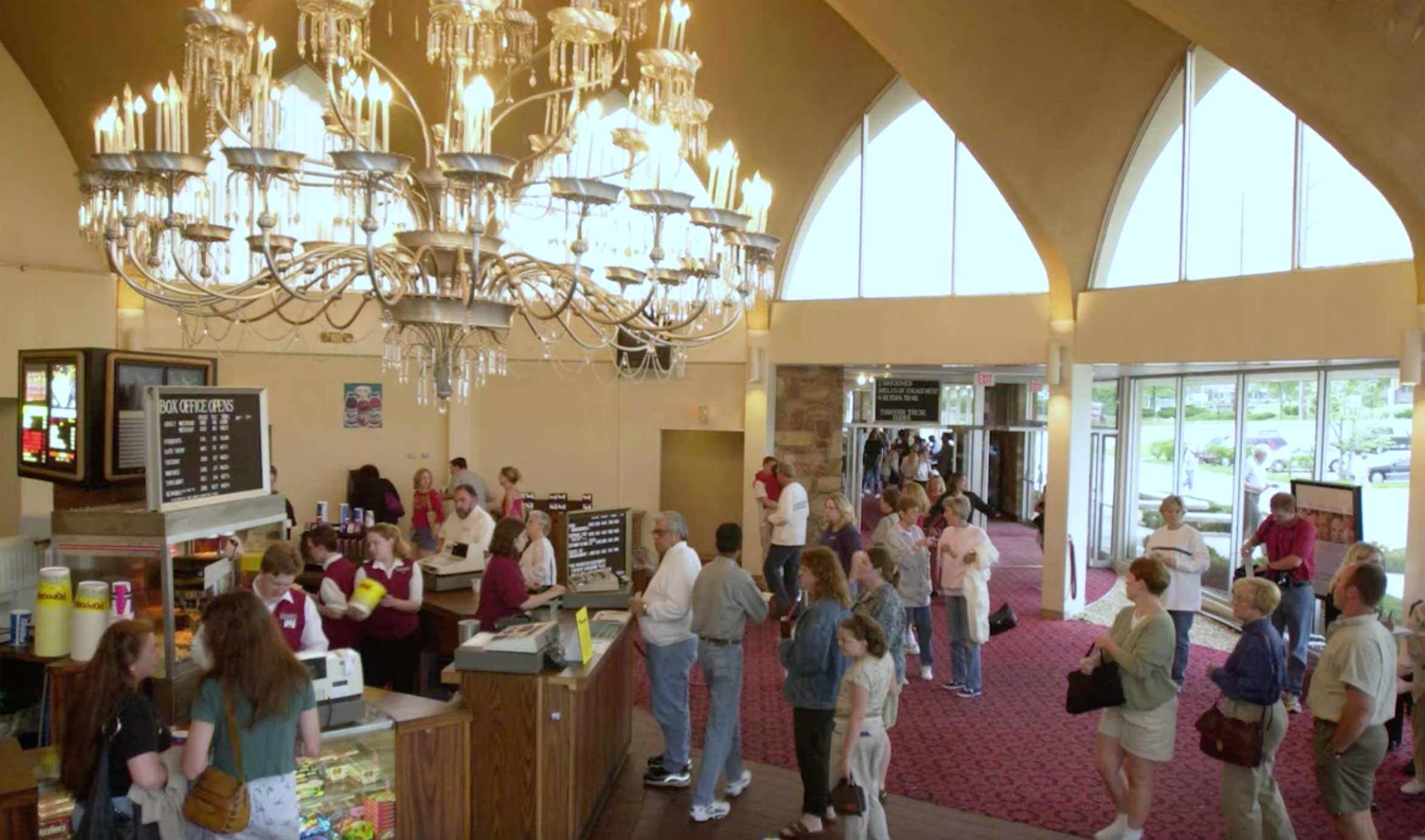
Lobby of the original Glenwood
The lobby of the original Glenwood. The ornate chandelier has since found a new home at the Glenwood Antique Mall in Overland Park, KS. (Image courtesy of Pinterest)
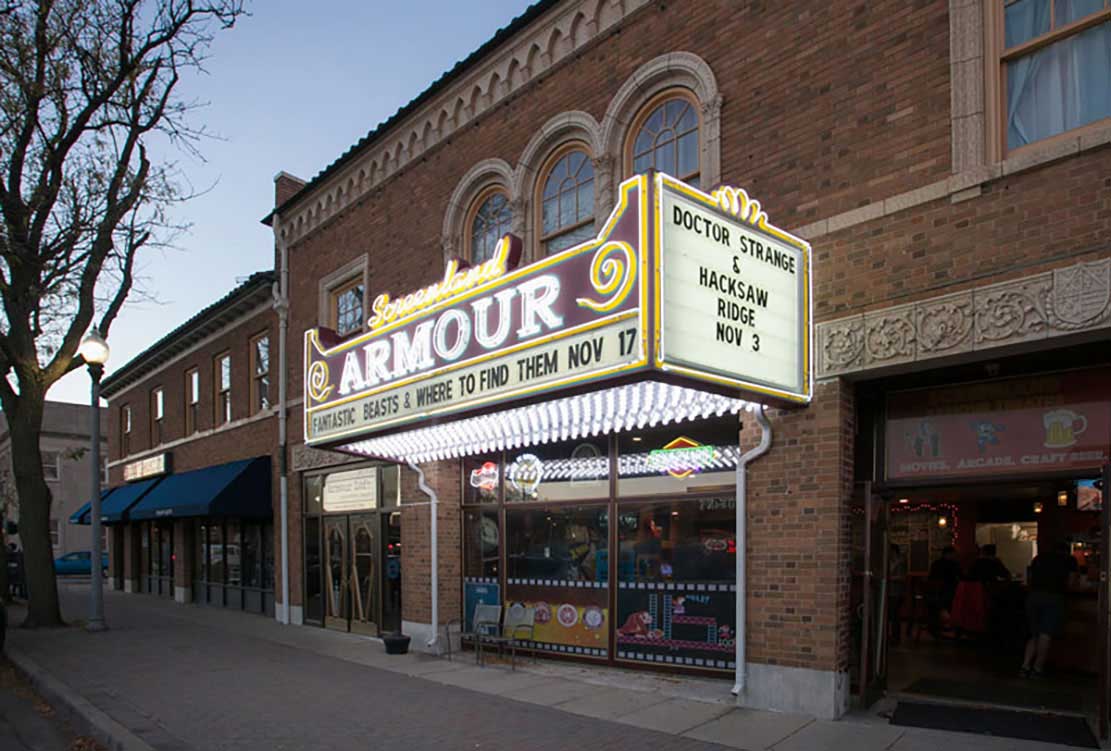
The Screenland Armour
The Screenland Armour’s exterior neon sign illuminates the night sky.
(Image courtesy of Visitkc.com)
The Rio has been listed on the National Register of Historic Places since 2005.
Mossman says he is heartened to see that even as streaming services rise in popularity, audiences still value a traditional moviegoing experience in a vintage or vintage-style theater.
“There is still a great number of people who want the experience of going out to the theater instead of staying home and eating kettle corn,” he says.
The Aztec Shawnee Theater – Shawnee, KS
Like other theaters in its proximity, The Aztec Shawnee doesn’t only specialize in films – it’s a venue that hosts other events as well.
One of the theater’s owners, Chris Calkins, says he had driven by the shuttered theater “hundreds, if not thousands of times,” in recent years and, in 2017, decided to purchase, renovate and reopen the location with the help of his brother and a mutual friend.
The Aztec Shawnee, which reopened in December 2020, has become a hot spot for a variety of guests and groups, from music lovers to wedding parties to receptions and birthday parties.
“The theater does mostly live bands on Friday and Saturday nights with some weekday and occasional Sunday classic movies,” Calkins says. “Our original goal when we first started planning was for the main focus to be on movies with some live entertainment from time to time but then after doing more research, we figured out that a small venue like ours could never compete with the big megaplexes on movies. to do that.”
Instead, Calkins says, the Aztec Shawnee shows a handful of classic films throughout the year – this summer’s offerings have included “All Quiet on the Western Front” and “The Adventures of Robin Hood.” This fall, classic horror fans won’t want to miss the original “Frankenstein” on Oct. 5 and 12, as well as “Bride of Frankenstein” on Oct. 19 and 28 (The venue’s first movie last year was a screening of the 1931 horror classic “Dracula” with Bela Lugosi). A complete list of all films and live musical performances being hosted by the Aztec Shawnee, meanwhile, can be found at www.aztecshawnee.com.
Besides films, Calkins says the Aztec Shawnee’s frequent collaboration with local businesses is one of the many features that sets it apart from other venues.
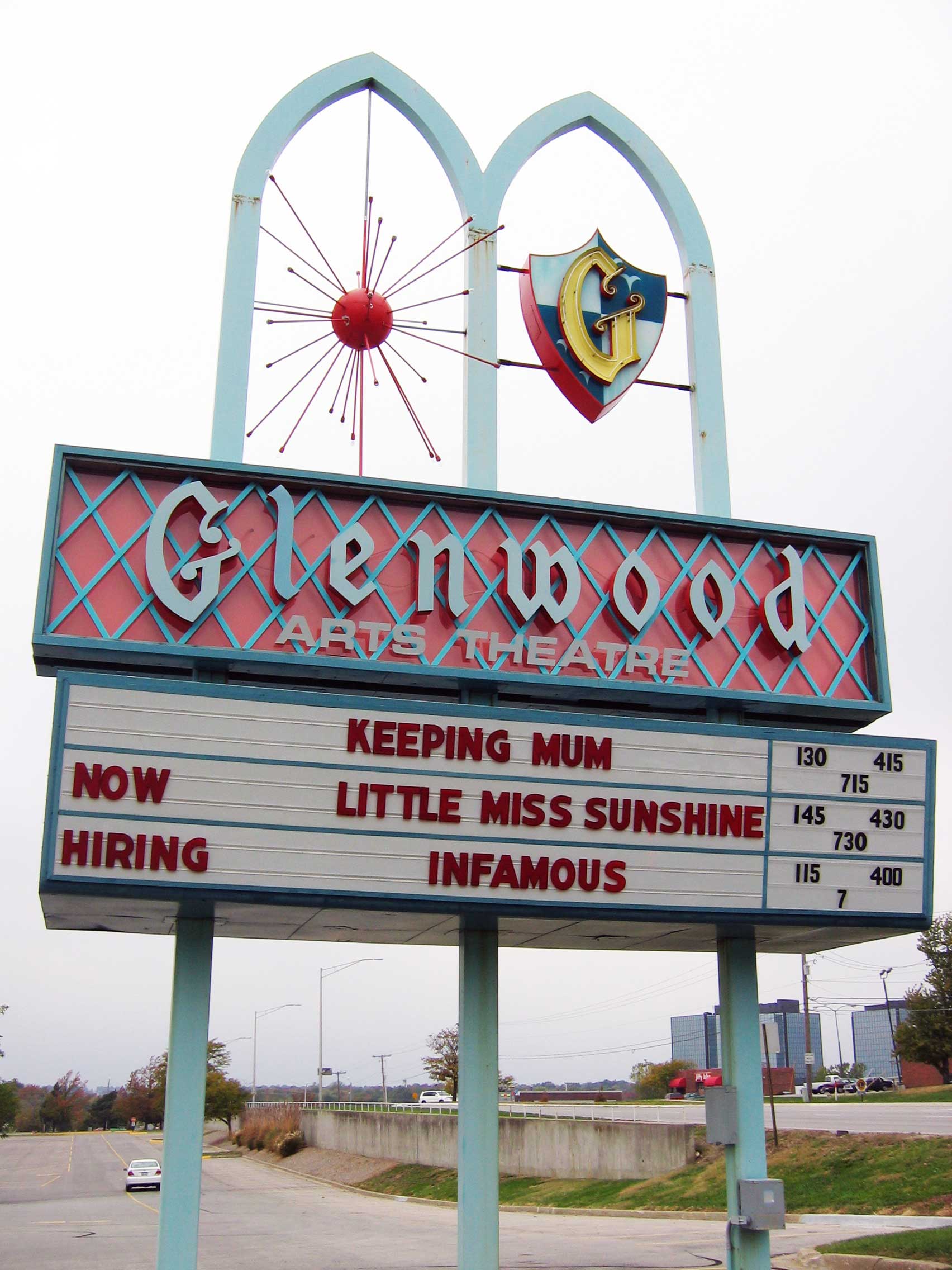
The atomic-age sign of the Glenwood
The atomic-age sign that stood outside of the original Glenwood Theatre welcomed visitors with a splash of color. (Photo by Patti Klinge)
“On most Friday and Saturday nights, you may find a food truck out front, and we allow the food truck food to be brought into the theater,” he says. “We have also teamed up with McLains Market right around the corner from us on a program where you can order from a specialized menu right from your phone in the theater and they will deliver it to the theater with no delivery charge.”
Calkins adds, “All of these classic movies have been a partnership with Shawnee Town 1929, and if you happen to be a member of The Friends of Shawnee Town, you can call them and get into these movies for free. So far, we have only been charging $5 to see movies at Aztec Shawnee Theater.”
Like other local theaters, the operation of the Aztec Shawnee is a labor of love for Calkins and his family.
“Just the beauty of the inside of the theater keeps people coming back,” Calkins says. “It is definitely a family affair, as at almost any event you will find several family members working the door or the concessions or just mingling with the crowd.”
The Boulevard Drive-In – Kansas City, KS
For a real drive-in experience, the Boulevard Drive-In has been welcoming motorists to its grounds since 1950.
Run and operated by the Neal family, the drive-in remains one of only a handful of drive-in theaters still open across the country. According to the theater’s social media pages, the theater almost closed in the 1970s, but owner Wes Neal was able to save the business by offering weekly swap-n-shop events – and it wasn’t long before sales of antique and vintage goods had saved the theater from closing.
Today, the theater still shows first-run films, the venue instantly recognizable by its sign, which the Neals say they believe should be on the National Register of Historic Places.
For more, including the Boulevard’s seasonal film calendar and swap meet schedule, visit www.boulevarddrivein.com.
And be sure to catch a flick at The Screenland Armour – North Kansas City, MO
The Armour Theater, built in 1928, during the era when “talkies” were the new fad in film, was bought in 2008 by developer Butch Rigby and renovated in 2012 by Adam Roberts and his business partner and brother-in-law Brent Miller. The two renamed the venue The Screenland Armour.
Specializing in independent and classic films – with a few first-run movies thrown in for good measure — the Screenland Armour celebrated an expansion in 2018, adding two screens, new projectors, sound systems, seats, and even a pizza shop (because what else would you pair with their extensive beer list?).
There are still vintage touches at the Screenland Armour, including its neon exterior signage and vintage arcade games. Be sure, too, to visit the Screenland Tapcade in the Crossroads Art District, featuring a full-service restaurant, arcade games, and regular trivia nights.
Visit www.screenland.com for tickets and showtimes.
Author’s disclosure: Corbin is the social media manager for The Glenwood Arts Theatre in Overland Park, KS.
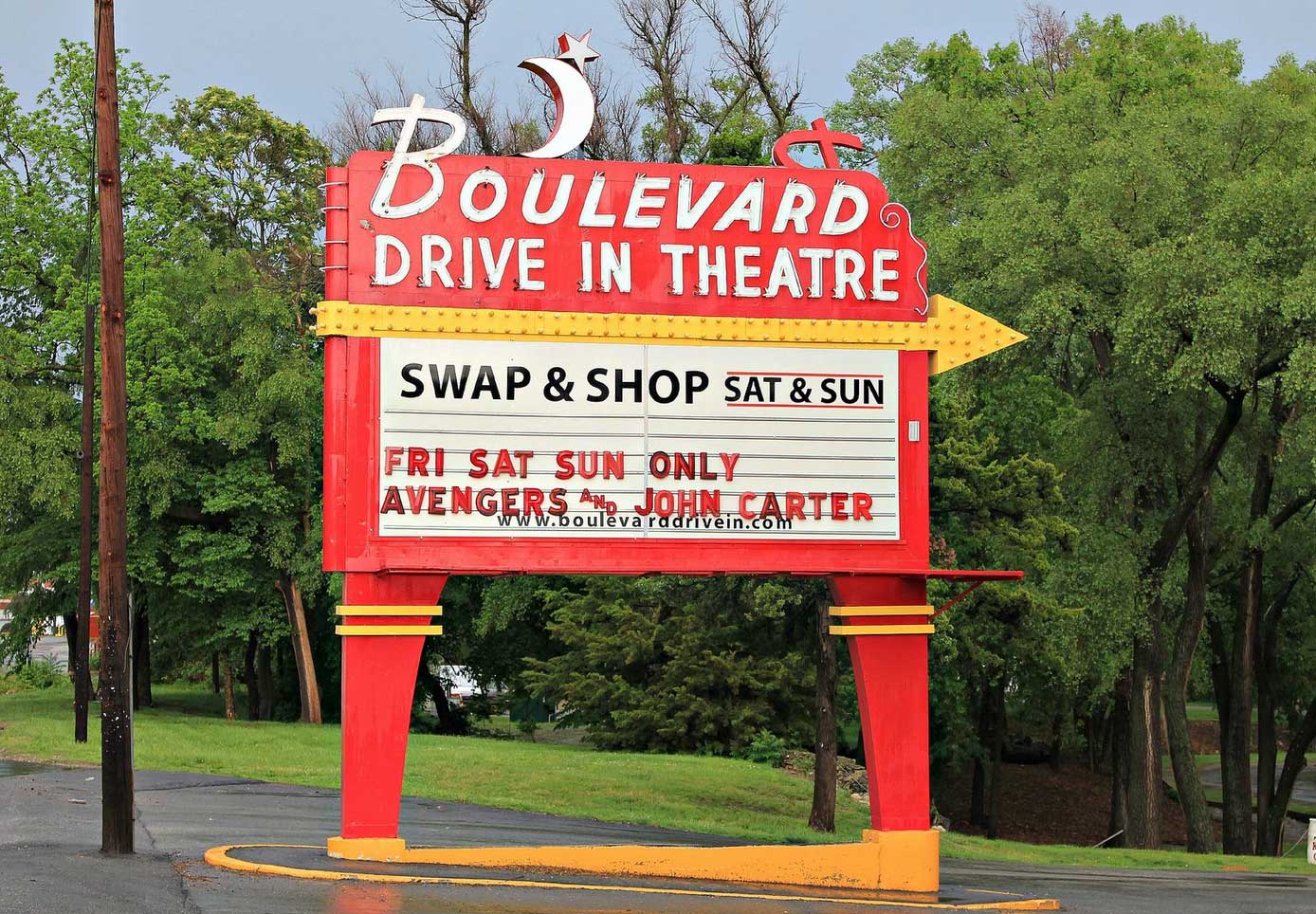
Boulevard Drive-In in Kansas City, KS
The sign at the Boulevard Drive-In in Kansas City, KS, advertises the venue’s weekly swap shop. (Image courtesy of Pinterest)
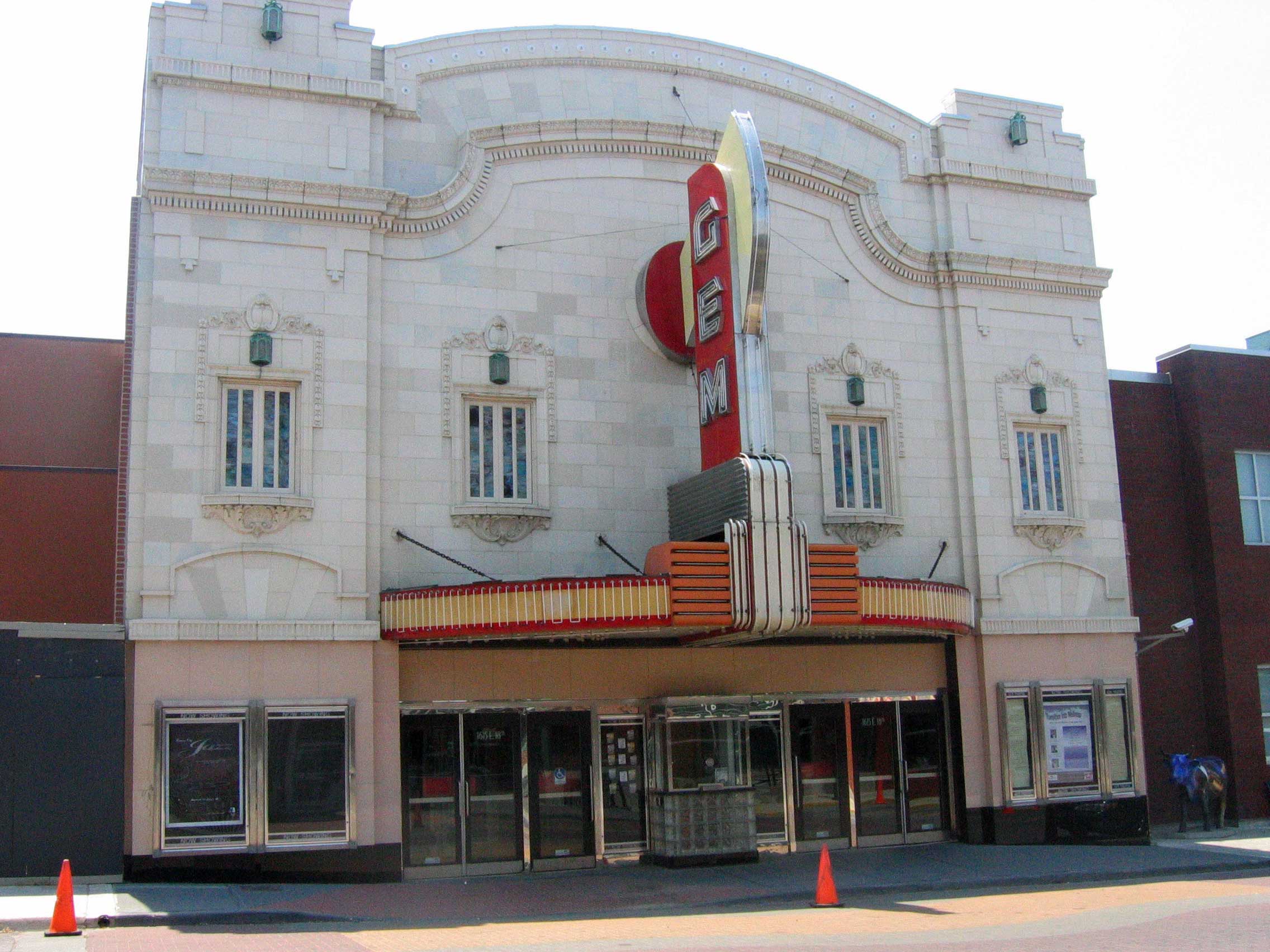
The Gem Theatre in Kansas City, MO
The Gem Theatre in Kansas City, MO, is another example of the beautiful Art Deco style used in the old theatres. Opened in 1912 as the Star Theatre. it was renamed Gem Theatre around 1914 and got a facelift in 1923. The Gem Theatre was built for use by African-American audiences and had a seating capacity for 1,414. Movies continued until the mid-1970s and then went to live performances. Since 1997, after a detailed renovation to create a 500-seat performance space which removed most of the original interior, it has been a venue for the American Jazz Museum located across the street. (Contributed by Chuck Van Bibber; Photo by Patti Klinge)


